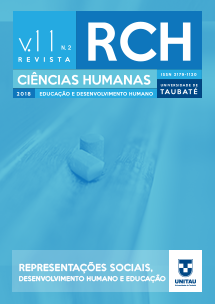APRENDIZAGEM BASEADA EM PROJETOS NO ENSINO DA SEGURANÇA DOS ALIMENTOS
DOI:
https://doi.org/10.32813/rchv11n22018artigo8Keywords:
Segurança dos Alimentos. ABP. Ensino e de Aprendizagem.Abstract
Esse artigo relata uma experiência que foi aplicada em uma escola particular do interior do estado de São Paulo, em uma turma do 8º ano do Ensino Fundamental II, sobre o desenvolvimento de um projeto intitulado “Segurança dos Alimentos”. O qual foi desenvolvido por meio da metodologia ativa denominada Aprendizagem Baseada em Projetos (ABP). O objetivo desse trabalho foi de promover um processo de ensino e de aprendizagem que relacione o conteúdo adquirido em sala de aula com a realidade vivida pelos alunos, além de desenvolver habilidades e competências, como a autonomia, o pensamento crítico e o trabalho em equipes. Para tal desenvolvimento, os alunos se dividiram em grupos e foram desafiados a pesquisar, visitar estabelecimentos comerciais de produção e venda de alimentos, realizar entrevistas e produzir um vídeo final sobre o tema. O projeto foi divido em três etapas, que se realizaram em um período de dois meses. A motivação e engajamento dos alunos durante a realização das atividades, foram fatores fundamentais na construção dos conteúdos de aprendizagem e desenvolvimento de habilidades e competências transversais.
Metrics
References
A importância da segurança dos alimentos. https://www.tuvsud.com.br/uploads/images/1412603514529807161238/seguranca-dos-alimentos-final.pdf. Acesso em 19 Mar 2017
ANVISA. Vigilância organiza mobilização nacional por alimentação segura. Disponível online em jun. 2015. <https://bit.ly/2x61aAE >. Acesso em 26 mar. 2018.
BASTOS, C. C. Metodologias ativas. 2006. Disponível em: < http://educacaoemedicina.blogspot.com.br/>. Acesso em 25 Mai 2017.
BENDER, W. N. Aprendizagem baseada em projetos: educação diferenciada para o século XXI. Penso Editora, 2015.
BLUMENFELD, C. P. et, al. Motivating Project-Based Learning: Sustaining the Doing, Supporting the Learning,Educational Psychologist, 26:3-4, 369-398, 1991.
Boas Práticas Agrícolas para Produção de Alimentos Seguros no Campo. Perigos na Produção de Alimentos. 988504348 https://ainfo.cnptia.embrapa.br/digital/bitstream/item/18257/1/BOASPRATICASAGROPperigosvegetal.pdf . Acesso em 18 Mar 2017.
BORDENAVE, J. D.; PEREIRA, A. M. Estratégias de ensino-aprendizagem. 4. ed. Petrópolis: Vozes, 1982
BRASIL (1999). Diretrizes curriculares nacionais para o ensino médio. Parâmetros curriculares nacional – Ensino Médio, Vol. 1. Brasilia: Ministério da Educação, Secretaria da Educação Média e Tecnológica.
BUCK INSTITUTE FOR EDUCATION. Aprendizagem baseada em projetos: guia para professores de ensino fundamental e médio. Artmed, 2008.
COSTA, E. Q.; RIBEIRO, V. M. B.; RIBEIRO, E. C. O. Programa de alimentação escolar: espaço de aprendizagem e produção de conhecimento. Rev. Nutr., v. 14, n. 3, p. 225-229, 2001.
GÜLBAHAR, Y,; TINMAZ, H. (2006). Implementing project-based learning and e-portfolio assessment in an undergraduate course. International Society for Technology in Education, 309-327.Canadá, 2006.
LEE, Y.M. Project-Based Learning Involving Sensory Panelists Improves Student Learning Outcomes. J Food Sci Educ 2015;14(2):60-65.
MARMENTINI, R. P.; ALVARENGA, V. O.; RONQUI, L. Manual de Boas Práticas de Manipulação de Alimentos. Universidade Federal de Rondônia – UNIR, 2010. Disponível em: Acesso em: 22 set. 2012.
OLIVARES, M.; USOBIAGA, A.; ZULOAGA, O."Can we trust thefoodwe find at the supermarket?" - aproject-basedlearningapproach for teaching chromatography" 7th international technology, education and development conference 2013.
SASSERON, L. H.; CARVALHO, A. M. P. de. Almejando a alfabetização científica no ensino fundamental: a proposição e a procura de indicadores do processo. Investigações em Ensino de Ciências, Porto Alegre, v. 13, n. 3, p.333-352, 2008. Disponível em: <https://www.if.ufrgs.br/cref/ojs/index.php/ienci/article/view/445/263>
WEINTRAUB, M.; HAWLITSCHEK, P.; JOÃO, S. M. A. Jogo educacional sobre avaliação em fisioterapia: uma nova abordagem acadêmica. Fisioterapia e Pesquisa. São Paulo, v. 18, n. 3, p. 280-286, jul./set. 2011.
ZHU, S. FANG, D. Teaching reform of functional foods course based on Project learning. Adv J Food Sci Technol ;8(2):105-108, 2015
Downloads
Published
How to Cite
Issue
Section
License
The publications of the Human Sciences Journal are registered under the Creative Commons Attribution CC-BY license.
1. The contents of the manuscripts are the exclusive responsibility of their author.
2. It is allowed the total or partial reproduction of manuscripts published in the journal, provided that the source is cited.
3. When submitting their manuscript to the Journal, the authors certify that they are of their own authorship and unpublished (not published in any digital or printed media).
4. The copyright of the articles published in the Journal are of the author, with first publication rights reserved for this journal.
5. For disclosure purposes, the Journal may replicate the works published in this journal in other media, such as social networks (Facebook, Academia.Edu, etc.).
6. The Journal is of public access, therefore, the authors who submit manuscripts agree that they are of free use.
7. In case of any illegality, fraud, or other attitude that puts in doubt the honesty of the publication, especially the practice of plagiarism, the manuscript will be automatically rejected.
8. If the manuscript has already been published, it will be immediately removed from the base of the Journal, its citation linked to the Journal will be prohibited and the cancellation of the referred publication shall be reported in the next issue of the one in which the article was published. In case of the procedure for the withdrawal of the paper the authors will be informed beforehand, being guaranteed the right to a broad defense.
9. The personal data provided by the authors will be used exclusively for the services provided by this publication and will not be made available for other purposes or to third parties.





